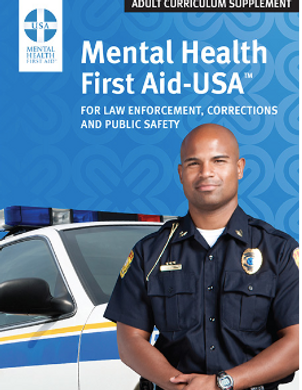
Mental Health First Aid is a public education program that introduces participants to risk factors and warning signs of mental illnesses, builds understanding of their impact, and overviews common supports. This 8-hour course uses role-playing and simulations to demonstrate how to offer initial help in a mental health crisis and connect persons to the appropriate professional, peer, social, and self-help care. The program also teaches the common risk factors and warning signs of specific types of illnesses, like anxiety, depression, substance use, bipolar disorder, eating disorders, and schizophrenia.
Like CPR, Mental Health First Aid prepares participants to interact with a person in crisis and connect the person with help. First Aiders do not take on the role of professionals — they do not diagnose or provide any counseling or therapy. Instead, the program offers concrete tools and answers key questions, like “what do I do?” and “where can someone find help?” Certified Mental Health First Aid instructors provide a list of community healthcare providers and national resources, support groups, and online tools for mental health and addictions treatment and support. All trainees receive a program manual to compliment the course material.
Course Details
Course Details
Mental Health First Aid teaches participants a five-step action plan, ALGEE, to help you learn the following skills:
-
Identify common mental health challenges for adults.
-
Increase awareness of and refer people to resources.
-
Teach participants to recognize symptoms, offer and provide initial help, and to guide a person to the appropriate treatments and other supportive help.
-
Dispel myths about mental illness and understand te prevalence of mental illness.
MENTAL HEALTH FIRST AID CURRICULA AND MODULES
The Adult Mental Health First Aid course is appropriate for anyone age 18 and older who wants to learn how to help a person who may be experiencing a mental health related crisis or problem. VSC provides training to participants who come from a variety of backgrounds and play various roles in a community.
In addition to the basic curricula that covers all industries, organizations and people, VSC Certified Instructors also specialize in providing modules that are specific to the following groups:



Learn more about our individual trainings:
-
Mental Health First Aid for Public Safety provides officers with more response options to help them better understand mental illnesses so they can respond to mental health related calls appropriately without compromising safety.
-
The course is taught to police, first responders,
-
corrections officers, and other public safety audiences around the country
-
Approximately 20,000 public safety professionals have taken the course, including at police academies in Philadelphia, DC, Seattle and numerous smaller and rural departments.
-
College and university students have unique stress and risk factors related to the demands of school
-
Statistics show that 75% of mental illnesses develop before age 25, making colleges ideal locations for early identification
-
Mental Health First Aid for Higher Education is designed with colleges’ and universities’ unique culture and resources in mind
-
Training students, faculty and others in higher education settings in Mental Health First Aid can lessen the severity and impact of mental health problems on campus
-
30 percent of active duty and reserve military personnel deployed in Iraq and Afghanistan have a mental health condition requiring treatment – with many experiencing post-traumatic stress disorder and major depression.
-
The Veterans Administration reports that approximately 22 veterans die by suicide each day.
-
Mental Health First Aid for Veterans focuses on the unique experiences and needs of the veteran and military populations.
